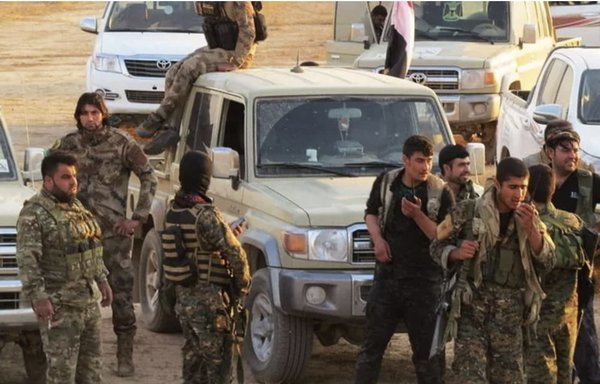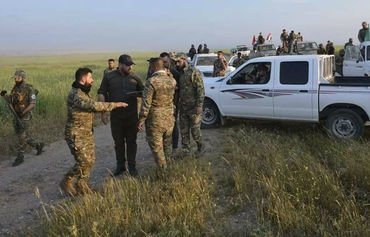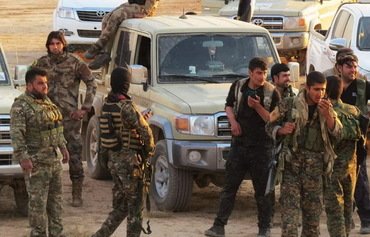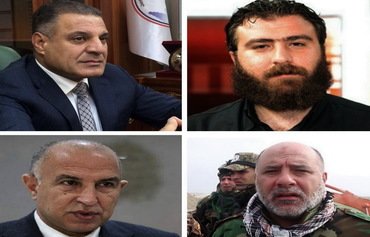The Hashd al-Shabak militia is continuing to impede the return of full stability and security to areas of Ninawa Plains, local officials said, despite ongoing efforts by Iraqi authorities and international organisations to rein it in.
Based in Iraq's Ninawa province, Hashd al-Shabak is affiliated with the 30th Brigade of the paramilitary Popular Mobilisation Forces (PMF).
Last year, the US Treasury issued sanctions against 30th Brigade commander Waad Qado (Abu Jaffar al-Shabaki) for perpetrating "serious human rights abuse or corruption" against the civilian population.
"Members of the local population allege that the 30th Brigade has been responsible for egregious offences including physical intimidation, extortion, robbery, kidnapping and rape," the Treasury said July 18th.

Members of the 30th Brigade are seen here in a photo published on the militia's website on July 7th, 2019.
Despite efforts to stop the militias' harassment of the local population, the militias are continuing to slow the return of peace, observers say.
'Main impediment to peace'
Hashd al-Shabak, along with Iran-backed militias Kataib al-Imam Ali, Kataib Hizbullah and Saraya al-Khorasani, is the main impediment to peace and the return of the displaced population to Ninawa Plains, a senior official at the Ninawa provincial headquarters told Diyaruna, on condition of anonymity.
With the chaos in Baghdad surrounding the formation of the new government and ongoing civil protests, no one is paying attention to the abuses these militias are committing against the local population, he said.
These include restricting private and public freedoms in Ninawa Plains, imposing taxes and fees, and conducting home searches without court orders, he said.
Police also are investigating the militias' involvement in the abduction of local residents for ransom, he added.
Dozens of displaced Ninawa Plains residents held a demonstration on February 6th to denounce the current state of lawlessness and condemn the violations committed by the militias.
A protest held on the main road between Dohuk and Mosul included displaced Kurds, Yazidis, Christians, Muslims and Turkmen, who raised signs demanding that these militias be expelled from their areas, local media reported.
The demonstrators accused the militias of seeking to undermine security and said they pose a major threat to the peaceful co-existence among the various ethnic and religious groups that make up the population of Ninawa Plains.
Harassing local residents
Iraqi MP Mohammed al-Abd Rabbo, who represents Ninawa province in parliament, told Diyaruna he has experienced the militias' harassment himself.
"So imagine what ordinary citizens have to go through," he said.
"I went to rent a house in Ninawa Plains a while ago, and [militias] imposed their conditions and interfered even in the rental contract," he said. "They impeded my residency because they did not want someone to expose their actions."
"The government issued a decree ordering armed groups to withdraw from all cities and residential neighbourhoods and security forces to take charge of maintaining security," he said.
"But some of those groups continue to stall and refuse to abide by the decision."
UN agencies and other international organisations have had to assign projects to local agents, as their employees were harassed whenever they visited Ninawa Plains cities, said former Ninawa provincial council member Ahmed al-Hamdani.
"The areas under army and police control are definitely the most stable, and the areas where the armed groups exert influence and have a presence are troubled and unstable," he told Diyaruna.
'We yearn for our lands'
Displaced Ninawa Plains resident Naima Yaqoub, 49, who now lives with her husband in Erbil's Ainkawa district, told Diyaruna she wants to return to her home, "but with the militias present there it cannot be comfortable".
Yaqoub said she and her husband returned last March to check out the situation, but they found checkpoints manned by militants who ordered her to wear a hijab and step out of the car for inspection.
"We yearn for our lands, areas, homes and all our neighbours, but now the idea is out of the question," she said.
"The Shabak militia is seeking to acquire lands, money and weapons in the Ninawa Plains, with Iranian support, at the expense of its original inhabitants," Iraqi affairs researcher Muayed al-Juhaishi told Diyaruna.
He noted that 30th Brigade commander Qado has been involved in smuggling drugs and crude oil from Ninawa oilfields, and that militiamen have been looting Assyrian archaeological sites and other ancient monasteries and churches.









This is a lie and defamation against the Popular Mobilisation Forces.
Reply4 Comment(s)
This isn’t true; it’s a total lie. Shame on you! Let people come in and see how the people of Ninawa Plains are living in peace and security. The writer of the article has no honour or integrity because he is telling lies and avoiding truth. Greetings.
Reply4 Comment(s)
This information isn’t true. It’s true that the families and supporters of "Islamic State of Iraq and Syria" (ISIS) elements aren’t allowed to return. As to others, they live peacefully together in Ninawa Plains. Those who want to make sure can visit Ninawa Plains and see how Kurds, Arabs, Turkmen, Shabak, and Christians live together in peace and security. You report is based on stories from ISIS elements and their cohorts only.
Reply4 Comment(s)
Your news story is fabricated. Only the families of "Islamic State of Iraq and Syria" (ISIS) members and their allies are allowed to return. As to others, they’re living in Ninawa Plains, and anyone who would like to make sure can visit Ninawa Plains and see how Kurds, Arabs, Turkmen, Shabak and Christians are living peacefully and safely together. Your report is based on stories by ISIS and their cohorts only.
Reply4 Comment(s)